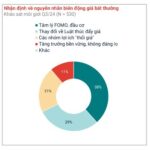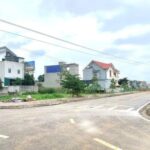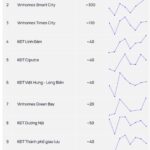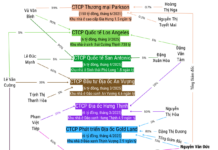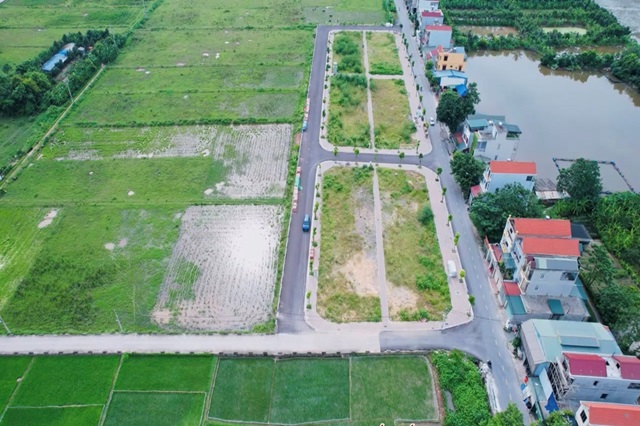
There is a need to screen participants and implement supplementary solutions to ensure that land auctions return to their intended nature.
|
In a discussion with the Chinhphu.vn e-newspaper regarding solutions to mitigate instances of winning bid prices being tens of times higher than the starting price and far exceeding the actual value in the area, as well as instances of land auction deposits being forfeited, real estate legal expert Nguyen Van Dinh shared his perspective on the matter. He suggested that screening participants and employing supplementary solutions would help bring land auctions back to their intended nature.
According to Mr. Dinh, the Land Law stipulates that for land auctions involving areas with existing infrastructure, the starting price is determined based on the state’s land price framework. However, the current land price framework only reflects 30-40% of market prices. Additionally, the requirement for an advance payment when bidding for land is set at 20% of the starting price. As a result, the low starting price and advance payment create a competitive mindset among participants, including those with genuine needs and investors. Professional real estate investors join the bidding process with the expectation of profitable returns if they win the auction at a reasonable price.
It is evident that the number of applications in recent land auctions in the outskirts of Hanoi has reached record highs. Statistics show that thousands of applications were submitted for 68 land lots in Thanh Oai, and the auction process was prolonged due to intense competition during the bidding stage. The low starting price and extended bidding process resulted in winning bid prices that were significantly higher than the initial price. “However, I believe this is a typical economic phenomenon and nothing out of the ordinary. Forfeiting a land auction deposit is not a criminal offense or a violation. If the land auction is part of a scheme to inflate prices and disrupt the market, investigative authorities will examine the specific actions rather than the act of forfeiting the deposit,” stated Mr. Dinh.
Analyzing the reasons behind this issue, Mr. Dinh attributed it to a limitation in the law, where the low starting price and advance payment do not create an initial screening mechanism for individuals and investors participating in the auction.
Furthermore, according to the law of supply and demand, the legal obstacles faced by real estate projects in the past have resulted in a significantly lower number of projects compared to the actual needs of the people. Individuals have both residential and investment needs, which are entirely valid. The limited supply coupled with high demand drives up real estate prices.
On the other hand, the Real Estate Business Law and the Housing Law have provisions in place to strictly manage and restrict land subdivision and sale in cities of the third category and above. This has significantly reduced the supply of land plots in the market compared to previous years. Consequently, in the context of the law’s non-implementation, individuals seeking to purchase the last few land plots turn to government land auctions.
Mr. Dinh explained that the essence of land auctions is for the state to allocate land to individuals, addressing the needs of the local population where the auction is held. However, in many recent land auctions, the winners have mostly been non-local investors rather than local residents. A notable example is the auction of 68 land lots in Thanh Oai on August 10, where only two local residents won the auction, while the rest were outside investors. As a result, the tool of land auctions has been distorted, becoming a game for investors without genuine housing needs, primarily participating to immediately transfer the land and make a profit.
If no solutions are implemented to address this situation, land prices will continue to rise in the long run.
“The outcome of land auctions will create a chain reaction. For land lots where the winning bidders fail to fulfill their financial obligations, the state retains ownership, leading to subsequent auctions. This process becomes a cycle, and the winning bid prices remain high. This creates a psychological effect, causing local residents who own land in the area to have high expectations regarding the value of their assets. Moreover, the transactions will contribute to an increase in land data. According to regulations, land prices should align with market principles and reflect market transaction values. In the long run, this accumulated land data will be collected and reflected in the locality’s annual land price framework,” analyzed Mr. Dinh.
Commenting further on the repercussions of high land prices, Mr. Dinh stated that it would impact the cost of living and housing for individuals. In addition to buying and selling transactions, fulfilling financial obligations such as name transfers, fees, and charges during the land management and utilization process would also become more expensive. This phenomenon affects numerous social entities. While the number of buyers and sellers may be limited, many people will be affected by the increased costs associated with maintaining land ownership annually. Consequently, higher land prices will make it challenging to attract investments. In the short term, higher revenues may be generated, but in the long term, the investment environment in these localities will suffer.
 Real estate legal expert Nguyen Van Dinh – Photo: VGP/Quang Thuong
|
Restoring the true nature of land auctions to meet the housing needs of the people
From the perspective of a real estate legal expert, Mr. Dinh offered several solutions for organizing land auctions to help curb the “frenzy.”
Currently, the Law on Auction of Assets, which will take effect in January 2025, includes provisions on sanctions for enterprises that win land auctions but forfeit their deposits. These enterprises will be banned from participating in auctions for five years. However, the law only imposes sanctions on enterprises and business entities. For individuals who fail to fulfill their financial obligations as stipulated, the consequence is the loss of the advance payment, and the land lot will be auctioned again.
The expert assessed that Hanoi’s decision to limit land auctions for allocating land to individuals for self-construction and prioritize auctions for land with collection of land use fees or land lease with organizations as the subjects for implementing investment projects is reasonable. Auctioning land for projects ensures more uniform infrastructure development and prevents speculation and land hoarding. In reality, winners of land auctions rarely build houses, and there are cases where land plots remain unconstructed for 5-10 years, becoming tools for speculation.
Mr. Dinh also suggested that in the future, land auctions should return to their true nature, with the state allocating land to individuals with housing needs in the area where the auction is held.
Many experts have proposed that participants in land auctions for land plots be restricted to individuals with permanent residence registration in the district where the auction is held. “Of course, if this proposal is approved, there may be some consequences. For example, professional investors may ask local residents to bid on their behalf, or local residents themselves may become amateur investors with the intention of transferring the land for profit. To address this issue, administrative orders could be implemented, such as prohibiting the winner from transferring the land for a certain period (2-3 years), or economic solutions could be explored, such as gradually increasing real estate taxes for transactions where the seller has a short holding period or if the owner does not construct a building after acquiring the land… These measures would help reduce the irregularities in buying and selling auctioned land, thereby reducing instances of price manipulation and deposit forfeiture. Thus, with participant screening and supplementary solutions, land auctions can be adjusted and returned to their true nature,” Mr. Dinh suggested.
Regarding long-term solutions, Mr. Dinh emphasized that high real estate prices result from supply and demand dynamics, with high demand from individuals but limited supply. Meeting the supply demand would address the root of the problem.
Whether the state auctions land to directly allocate it to individuals or to enterprises for project implementation depends on the state’s investment in budget funds for land clearance. Once the land is cleared, the state can organize auctions. The process of implementing this has been stipulated in the 2024 Land Law. A township project not only addresses housing needs but also ensures uniform infrastructure development, creating a driving force for growth. Auctioning small-scale projects does not generate the same impetus as bidding for larger-scale projects.
Thu Cuc
“The Hanoi Periphery Land Frenzy: How Hoai Duc District Prices Surged from $2,500/sq.m to $4,500/sq.m in Just Over a Year”
Mr. Nguyen Quoc Anh, Deputy General Director of Batdongsan.com.vn, revealed that compared to the first quarter of 2023, land prices in Hoai Duc have surged by 81%. The average market price has skyrocketed from 55 million VND per square meter to 100 million VND per square meter.
The Capital’s Proposal for an Investigation into Anomalously High Land Auction Bids, and Subsequent Forfeiture of Deposits.
The Hanoi People’s Committee has requested that the city’s police force employ operational measures to promptly detect violations in land auctions. They have also proposed solutions to prevent or restrict the continued participation of bidders who consistently place abnormally high bids and then forfeit their deposits.
10 Resale Condos Account for 50% of Hanoi’s Market Share in August
In August, the top 10 apartment projects with the highest number of transfers included prestigious names such as Vinhomes Ocean Park, Vinhomes Smart City, and Vinhomes Times City. These were followed by well-established urban areas: Linh Dam, Ciputra, and Viet Hung – Long Bien. Rounding out the list were Vinhomes Green Bay, Duong Noi Urban Area, the City of Transportation Exchange, and Goldmark City.


